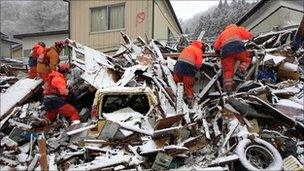Japan earthquake: UK rescue team 'foiled by red tape'
- Published
Ray Gray and Julie Ryan told the BBC they were disappointed they could not assist
UK rescue workers say they had to leave quake-hit Japan because they could not secure the necessary paperwork from the British embassy in Tokyo.
The International Rescue Corps said they were not given permission to work in Japan because it would have made the embassy legally responsible for them.
The Foreign Office said it was "not true" it was thwarted by red tape.
It said it had sent a letter of support to the Japanese Ministry of Foreign Affairs early on Wednesday morning.
A spokesman for the IRC said it was "gut-wrenching" to be stopped from helping by "your own country".
A 9.0-magnitude quake and tsunami struck north-east Japan on Friday, killing thousands and leaving more than 400,000 people homeless. Many survivors are facing power, fuel and food shortages, amid freezing temperatures and aftershocks.
'Show-stopper'
Willie McMartin, operations director at Grangemouth-based International Rescue Corps (IRC), said the team had no choice but to leave.
"The team has had excellent help from the Japanese embassy in London and the authorities in Tokyo but it broke down when they couldn't get the relevant paperwork from the British embassy in Tokyo," he said.
"This was the 32nd world disaster we have been to and we've only had problems twice before with host governments in China and Afghanistan.
"We have never encountered the position where the British embassy, our own country, came up with a show-stopper."
Mr McMartin said the team had permission from the Japanese embassy in London but they could not get a letter of authorisation from British officials in Japan stating that they were a bona fide organisation. They needed this so they could move around the country and buy fuel.
The 15 volunteers, who were going to focus on humanitarian rather than search-and-rescue work, arrived in Tokyo on Monday night and caught a flight home at 1300 local time on Wednesday. They donated their food and medical supplies to the Salvation Army working in the country.
The Foreign Office said: "We sent a letter of support to the Ministry of Foreign Affairs early on the morning of 16 March at the request of the Japanese. Our staff followed this up with phone calls to the foreign ministry.
"It is not true that the IRC team's effort was delayed by British red tape."

A government-deployed search and rescue team is already working in Japan
Foreign Secretary William Hague told MPs on the Foreign Affairs Committee it was "convenient to blame embassies for difficulties which have arisen in other ways".
He said the team did not have logistical, transport or language support and the Japanese government had made it clear they could not supply it.
'Self sufficient'
But speaking after he arrived back at London's Heathrow airport, Ray Gray, the team's leader, said that simply was not true.
"We have been doing this for a long time. We had permission from the country, we had a translator, we had sourced vehicles, we are completely self-sufficient. We had registered with the UN. All we needed was a piece of A4 paper to continue, and we couldn't get it," he said.
A 63-strong UK International Search and Rescue (Isar) team deployed by the Department for International Development is based in a school in Sumita, 20km (12 miles) outside Ofunato, one of the many coastal communities devastated by the tsunami.
On Wednesday, the team completed its clearance of the disaster zone in Ofunato. No survivors were found.
It then travelled 30km north to Kamaishi, where 1,000 people are reported missing. In heavy snow, it started to search the central industrial area which had been badly affected. Three bodies were detected in the debris, but no survivors were found.